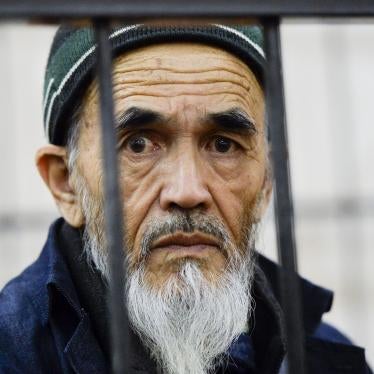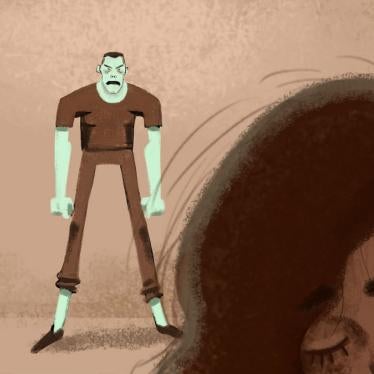(Berlin) – Kyrgyz security services detained a well-known rights defender on dubious grounds on May 29, 2020, and on May 31, a court ordered him placed under house arrest, Human Rights Watch said today. Kyrgyz authorities should lift the two-month home arrest order imposed on Kamil Ruziev, the activist, drop all bogus charges against him, and investigate allegations that Kyrgyz security services have threatened him.
“Ruziev filed formal complaints against security officers, so Kyrgyzstan’s security service responded by harassing him with a bogus criminal investigation,” said Mihra Rittmann, senior Central Asia researcher at Human Rights Watch. “Prosecution authorities should instead be carrying out a thorough and timely investigation into Ruziev’s complaint and any abuse of power by the security officials who arrested him.”
State National Security Committee (GKNB) officers arrested Ruziev on the evening of May 29 outside the Karakol City Courthouse, which was considering a lawsuit he had filed against the GKNB and the prosecutor’s office for not investigating his complaint that law enforcement officers had threatened him, including at gunpoint.
After his arrest, the GKNB issued a statement saying that Ruziev was under investigation on criminal charges of forgery and fraud. However, during the hearing on May 31 to determine whether he would be held in pretrial detention, the investigator acknowledged that at the time of his arrest, Ruziev was wanted only as a witness. He said they had now changed his status to suspect and were pursuing the case only on charges of forgery. Ruziev told Human Rights Watch that the authorities had only informed him that they changed his status to suspect immediately before the hearing. The court approved Ruziev’s house arrest for two months. Ruziev and his lawyer have appealed the ruling and filed a complaint against the GKNB for unlawful detention.
Ruziev, 56, is a human rights defender and the head of the Karakol-based human rights organization Ventus. He is well-known for his work to end torture in detention and has also provided legal assistance in domestic violence cases. Law enforcement agents have repeatedly harassed and threatened Ruziev in retribution for his human rights activities.
While he was in GKNB custody, officers questioned Ruziev without his lawyer of choice present and refused to hand over copies of procedural documents.
Ruziev believes he was arrested in retribution for his human rights activities.
“Over the last year I have been filing complaints against the GKNB and the prosecutor’s office,” he told Human Rights Watch. “I also help others whose rights have been violated. The GKNB knows of my human rights work and decided to put pressure on me to get me to stop.”
The GKNB’s harassment of Ruziev is taking place against a backdrop of attempts by the Kyrgyz Parliament to adopt amendments to a law concerning nongovernmental groups that are aimed at tightening controls over civil society. The draft law, which targets non-profit organizations in particular, would impose additional burdensome financial reporting requirements that would interfere in activists’ ability to carry out their work.
Public hearings on the bill went ahead on May 22, despite quarantine measures still in place in Kyrgyzstan’s capital to limit the spread of the Covid-19 virus. Nongovernmental groups had asked parliament to reschedule the hearing. Because of limits placed on the number of people who could enter the building, many representatives of groups who had registered to participate were not allowed into parliament, undermining the integrity of the process.
At the hearing, Ozonnia Ojielo, the United Nations resident coordinator and representative of the UN secretary-general in the Kyrgyz Republic, testified that the bill would impose an “onerous burden on civil society organizations” and urged the parliament to “seriously reconsider.” Eduard Auer, the European Union ambassador to Kyrgyzstan, also testified, saying that “civil society is a crucial partner to the EU” and that “it is important that new legislation does not make their work more difficult.”
Previously, the Kyrgyz parliament tried to adopt a Russia-style “foreign agents law,” requiring groups that received foreign funding to register as foreign agents, but after significant domestic and international outcry, the bill was ultimately scrapped.
“Parliament should withdraw the bill restricting nongovernmental groups and allow human rights defenders and civil society to play their very important role in addressing the needs of regular citizens and furthering Kyrgyzstan’s democratic development,” Rittmann said. “The authorities should immediately end the bogus investigation into Kamil Ruziev and ensure the GKNB cease its intimidation tactics so that he and other activists can continue their important work.”
|
News Release
Kyrgyzstan: Rights Defender Under House Arrest
Cancel House Arrest; Investigate Complaint; Withdraw Proposal Designed to Stifle Activism
Your tax deductible gift can help stop human rights violations and save lives around the world.
Region / Country
Topic
Most Viewed
-
June 3, 2025
“They’re Ruining People’s Lives”

-
January 25, 2024
“We’re Dying Here”

-
April 27, 2021
A Threshold Crossed

-
November 25, 2019
A Dirty Investment

-
November 19, 2012
Losing Humanity




